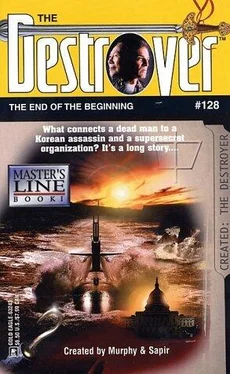Eyes closed, Chiun had been slowly counting to ten. "Do you always talk so much?" the Master of Sinanju asked.
"Show me how to break a board with my hand and I'll stop," Remo said. "Does it hurt when you do it? The guy at the academy screamed bloody murder when he did it. I'm not sure he screamed 'cause it hurt, though."
Chiun opened his eyes. "Hold your breath in the pit of your stomach for five seconds, then release."
"Why five seconds?" Remo asked.
Chiun hissed angrily. "Why two lungs? Why one turnip-sized nose? Why breathe at all?"
"Okay. That's sarcasm. Five seconds it is." Remo sucked in a deep breath. He immediately let it back out. "Wait, you got a watch?"
"Timepieces are a confidence trick invented by the Swiss," Chiun explained. "Count in your head."
"Got it," Remo said. "It's a count by hippopotamus."
"What?" Chiun asked, voice flat.
"You know. One hippopotamus, two hippopotamus, like that. It leaves a break between the seconds so you don't rush them. Some people prefer Mississippi. Are you a Mississippi man?" Remo's questioning face was sincere.
Chiun went to Smith's office.
"I quit," said the Master of Sinanju.
"We have a deal," the CURE director replied firmly. "Until Remo's first service."
Reluctantly, Chiun returned to his quarters. When the old Korean reentered the room, he found Remo flopped on the floor watching television.
"I thought you said you were leaving," Remo said. He didn't look up as the Master of Sinanju padded in.
"It appears I am a hostage to my ethics," Chiun complained to himself.
"Yeah, that's rough," Remo said, hardly listening. He was busy watching an F-Troop rerun.
"Your breathing is still terrible," Chiun pointed out to the beached white thing wheezing on his floor. Lying on his back, head cradled in his interlocked fingers, Remo attempted a semishrug. "I'm just happy I'm breathing at all. They plugged me in like a short-circuiting waffle iron, you know. I almost died."
"And if you had, I am certain the chimps of the world would still be mourning the loss of their king," Chiun said. He suddenly noticed something. "Is that my best sleeping mat you are squatting on?" the old man demanded.
"Oh," Remo said, sheepish. "Is this yours?"
A single touch left Remo rolling in agony on the floor of Chiun's quarters. As the young man writhed in pain, the Master of Sinanju returned to Smith's office.
"I can do nothing with that thing," Chiun pleaded. "He has no respect for me. He has no respect for my property. I would have an easier time training this one." He waved a bony hand at Conrad MacCleary, who was sprawled on the sofa near Smith's closed office door.
"That is out of the question," Smith said firmly. Behind him, a big picture window of special one-way glass overlooked Long Island Sound. "MacCleary is too old. We need a man who will last for at least several years. A young man just might be able to survive. Besides, Conn's prosthetic makes him too easy to spot."
Chiun threw up his hands. "Then give me a young man. In Sinanju the training begins not long after birth. Give me an infant and perhaps I can do something."
"We cannot wait that long, Master Chiun," Smith said somberly. "Like it or not, Remo is your pupil." The old man muttered something in Korean that had no relation to the flattery he normally lavished on Smith. Still griping to himself, he stormed from the room.
Reaching across the arm of the couch, MacCleary nudged the door until it clicked shut.
"Those two are off to a rocky start," Conn suggested.
"They do not have to like each other," Smith said. He was studying his computer monitor.
"And what was that crap about me being too old?" MacCleary said. "I'm only four years older than you."
Smith didn't raise his eyes from his desk. "Yes," he said. "And I'm too old for fieldwork, as well." After reading a few lines of plain text from his screen he offered a low "Hmm."
"What's wrong?" MacCleary asked.
Smith glanced up, a worried expression on his face. The grave look confirmed MacCleary's worst fears. "Damn," Conn said. "I thought that was your something's bad 'hmm.' What is it?"
"I told you of the FBI agent who was killed while investigating the Maxwell matter," Smith said. "I dispatched two others to follow up. They've disappeared."
MacCleary sat forward on the sofa. "You sure?" Smith nodded. "According to the FBI, they have failed to report in. My unofficial source within that agency who is keeping me informed on the matter has said that they are now listed within the Bureau as missing."
Conn shook his head. "This isn't right, Smitty," he said. "I thought this Maxwell thing was supposed to be small potatoes. Just some new Mob enforcer."
"That is what my early intelligence indicated. Using CURE's resources, I assumed we should have been able to locate him and turn him over to the proper authorities."
"Yeah, well, so much for the proper authorities," MacCleary said. "One's dead and two others are probably with him." He stood. "I suppose you're sending me in."
MacCleary was surprised by the CURE director's answer.
"No," Smith said. "Although that which is permitted us in the operational line of duty has recently been expanded, we shouldn't rush off half cocked. We need to preserve this authorization for only the most dire circumstances."
Standing on the worn carpet, MacCleary threw up his one good hand in frustration.
"It's killing, Smitty," Conn growled. "You won't die if you say the word. We've been okayed to kill in the line of duty. Finally. We've been pissing our pants like a bunch of scared choirboys for the past eight years, afraid to get our hands bloodied in this. Now we've got our chance, and I say use it. Three dead feds is good enough excuse for me."
But Smith was adamant. "No," he repeated. "This Maxwell-whoever he is-is just another face on organized crime. There have been many before him, and there will be many more after him. I will not risk your life or the exposure of this agency to go after one man. Not at this time. Not when we are on the verge of something that could finally turn this war to our advantage."
There was a fire in Smith's eyes. MacCleary had seen that look before. It was there when the two had met in World War II. It was there, too, when Smith returned to the CIA after his postwar studies to become superior of Conrad MacCleary, who had barely graduated high school. And it was there eight long years ago when the two men had secretly met on a motor launch in the Atlantic ten miles east of Annapolis to discuss a new covert organization.
The gleam in Harold Smith's eye was pure, unadulterated patriotism. The kind that was born in a hot, insect-filled hall in Philadelphia on July 4, 1776. The kind that had been consecrated in blood on fields in Lexington and Gettysburg, on beaches in Normandy and Iwo Jima, and at a thousand other places in between. The kind of raw, certain patriotism that was once part of a great nation's soul and that, sadly, was rapidly falling out of fashion in school rooms and government halls all across the fruited plains.
"You're going to sic Williams on him? The kid's greener than horseshit. He won't be ready for months."
"Then we will wait months," Smith said. "Yes, we have been given new authorization. But I am not so anxious to use it that I can't exercise patience. Let's give Williams time to complete his training. Has Master Chiun indicated how long he thinks it will take to bring him up to speed?"
"No," MacCleary said sullenly. "And don't forget, Chiun isn't the only one. Remo's got other trainers out there, too. Weapons, disguise, the whole James Bond works."
Smith nodded. CURE's new operative would be given the best possible instruction in all facets of fieldwork.
It was a schedule that had given MacCleary great difficulty. The situation with Chiun was unique. Unlike the Master of Sinanju, the other trainers couldn't be brought here to Folcroft. Not without breaching security. Nor could they be active-duty agents themselves, for fear they might alert higher-ups within their respective organizations. The men who would be teaching Williams would be doing so at remote locations. All were former intelligence agents, and none would know for whom they were working.
Читать дальше




